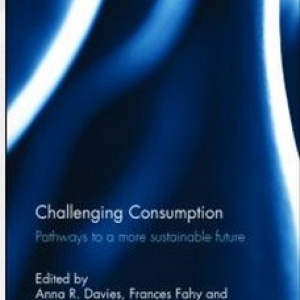
The book ‘Challenging Consumption’, produced by the CONSENSUS research team, explores the topic of sustainable consumption. It includes discussions on future scenarios and innovations for sustainable food consumption practices. The book was launched in Dublin on 12th June 2014 by Dara Lynott, a Director of the Environmental Protection Agency who funds CONSENSUS research.
Abstract
The CONSENSUS team from Trinity College Dublin and National University of Galway, have worked over the past five years to identify and evaluate more sustainable consumption practices, including in relation to food. The results of this work have been published in a new book Challenging Consumption: Pathways to a more sustainable future available for pre-order from Routledge. Informed by a number of disciplinary perspectives, Challenging Consumption is structured around four key themes in sustainable consumption research: Living, Moving, Dwelling and Futures. The collection successfully balances theoretical insights with grounded case studies, on mobility, heating, washing and eating practices, and concludes by exploring future sustainable consumption research pathways and policy recommendations. Theoretical frameworks are advanced throughout the volume, especially in relation to social practice theory, theories of behaviour change and innovative backcasting methodologies. The book draws on conceptual approaches which move beyond the responsibility of the individual consumer to take into account wider social, economic and political structures and processes to highlight both possibilities for, and challenges to, sustainable consumption. This approach enables stakeholders, students and policy-makers alike to easily recognise the applicability of social science theories.
Citation
Davies, A.R., Fahy, F. & Rau, H. (2014) Challenging Consumption: Pathways to a more sustainable future, Routledge, London.
For more information about the book, see here. You can also read more about it on the Consensus website here.







Post a new comment »